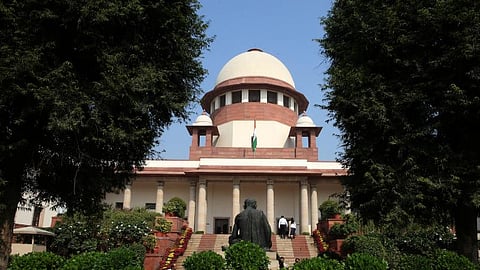75 percent quota in private jobs: SC notice to Centre on Haryana's plea challenging HC order
NEW DELHI: The Supreme Court on Monday sought response from the Centre on a plea filed by the Haryana government against the Punjab and Haryana High Court order declaring as "unconstitutional" its law providing 75 per cent reservation in private sector jobs to the residents of the state.
A bench of Justices P S Narasimha and Aravind Kumar issued notice to the Union of India and the Faridabad Industries Association on the appeal filed by the Haryana government.
Solicitor General Tushar Mehta, appearing for the Haryana government, submitted that the high court verdict was devoid of reasoning. The Haryana government has moved the top court against the high court order of November 17, 2023.
The high court had also held the Haryana State Employment of Local Candidates Act, 2020 "ultravires" and said it would become "ineffective from the date it came into force."
In its 83-page judgement, the high court had said, "We are of the considered opinion that the writ petitions are liable to be allowed and the Haryana State Employment of Local Candidates Act, 2020, is held to be unconstitutional and violative of Part III of the Constitution of India and is accordingly held ultra vires and the same is ineffective from the date it came into force."
The high court had admitted multiple petitions against the act that came into effect on January 15, 2022, and provided 75 percent reservation in jobs in the private sector to candidates from the state. It covered jobs offering a maximum gross monthly salary or wages up to Rs 30,000.
In its order, the high court had said, "The underlying object of the legislation, as has been succinctly put by counsel for the petitioners, is to create an artificial gap and a discrimination qua the citizens of India."
The high court was of the opinion that it is beyond the purview of the state to legislate on this issue and restrict private employers from recruiting from the open market for the category of employees who were receiving less than Rs 30,000 per month.
"It is not for the state as such to direct the private employer who it has to employ, keeping in view the principles of laissez-faire that 'the lesser it governs, the better itself'," the high court had said.
"It (the state) cannot, as such, discriminate against individuals on account of the fact that they do not belong to a certain state and have a negative discrimination against other citizens of the country," it had said.
"Once there is a bar under the Constitution of India, we do not see any reason how the state can force a private employer to employ a local candidate, as it would lead to large-scale similar state enactments providing similar protection for their residents and putting up artificial walls throughout the country, which the framers of the Constitution had never envisaged," stated the high court order.
The high court had observed that the concept of constitutional morality has been openly violated by introducing a secondary status to a set of citizens not belonging to the state of Haryana and curtailing their fundamental rights to earn their livelihood.
It had also stated that there is a bar under the Constitution on discrimination among citizens in matters of employment on the basis of their places of birth and residence.
The act was applicable to employers of private sector companies, societies, trusts, limited liability partnership firms, partnership firms, and any person who employs 10 or more persons on salary, wages, or other remuneration for manufacturing, carrying on business, or rendering any service in Haryana.
Providing 75 per cent reservation in private sector jobs for the state-domiciled was a key poll promise of the Jannayak Janta Party, a ruling coalition partner, at the time of the 2019 assembly polls.

